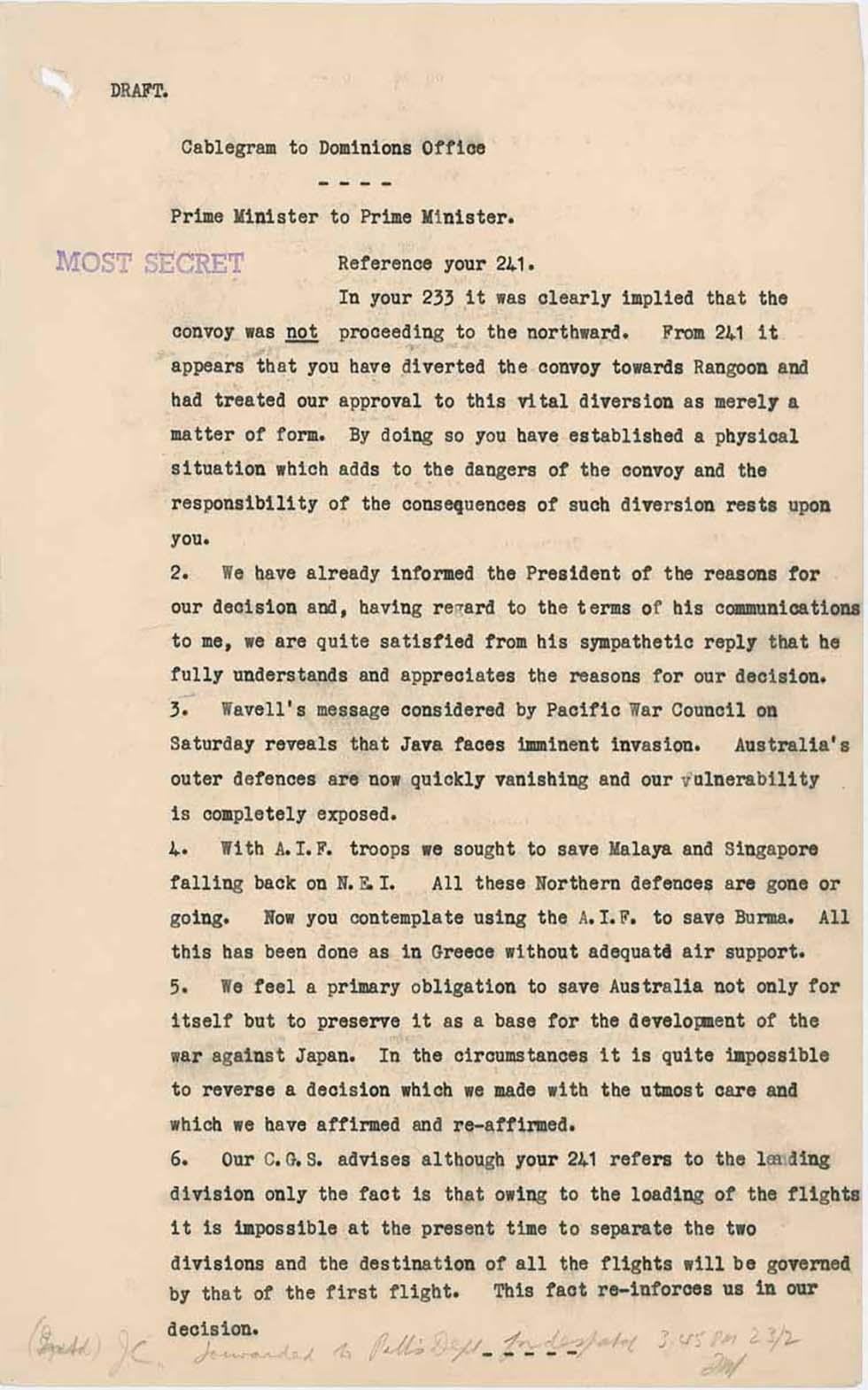


Transcript
DRAFT.
Cablegram to Dominions Office
Prime Minister to Prime Minister.
MOST SECRET
Reference your 241.
In your 233 it was clearly implied that the convoy was not proceeding to the northward. From 241 it appears that you have diverted the convoy towards Rangoon and had treated our approval to this vital diversion as merely a matter of form. By doing so you have established a physical situation which adds to the dangers of the convoy and the responsibility of the consequences of such diversion rests upon you.
2. We have already informed the President of the reasons for our decision and, having regard to the terms of his communications to me, we are quite satisfied from his sympathetic reply that he fully understands and appreciates the reasons for our decision.
3. Wavell's message considered by Pacific War Council on Saturday reveals that Java faces imminent invasion. Australia's outer defences are now quickly vanishing and our vulnerability is completely exposed.
4. With AIF [Australian Imperial Force] troops we sought to save Malaya and Singapore, falling back on NEI [Netherlands East Indies]. All these northern defences are gone or going. Now you contemplate using the AIF to save Burma. All this has been done as in Greece without adequate air support.
5. We feel a primary obligation to save Australia not only for itself but to preserve it as a base for the development of the war against Japan. In the circumstances it is quite impossible to reverse a decision which we made with the utmost care and which we have affirmed and re-affirmed.
6. Our CGS [Chief of General Staff] advises although your 241 refers to the leading division only the fact is that owing to the loading of the flights it is impossible at the present time to separate the two divisions and the destination of all the flights will be governed by that of the first flight. This fact reinforces us in our decision.
About this record
Marked 'most secret', this is the draft of a cablegram written by Australian Prime Minister John Curtin to his British counterpart, Winston Churchill, on 23 February 1942. Curtin points out that Churchill has ignored Australia's wishes by diverting ships carrying Australian troops towards Burma, apparently expecting Australia's approval as a matter of form. Curtin restates Australia's wish for the troops to be sent home, as Australia's 'outer defences' are quickly vanishing and the country's vulnerability is 'completely exposed'.
Educational value
- This cablegram illustrates the extent of the danger that Curtin believed Australia faced following the fall of Singapore. British forces in Singapore surrendered on 15 February 1942. Of the 130,000 personnel who became prisoners of Japan, about 15,000 were Australians. The fall of Singapore prompted an immediate change in Australia's war strategy, in particular the decision that the 6th and 7th Australian Divisions then at sea and heading for Java (Indonesia) be diverted to Australia.
- This communication reveals the momentous decisions Prime Minister Curtin faced during wartime. Four days before this cablegram was sent, Japanese planes had bombed Darwin, and Japanese forces were making advances in parts of Asia and the Pacific. The Australian Government decided to declare war on Japan on 8 December 1941, after it had learned that the Japanese were attempting to land troops in Malaya and had attacked Pearl Harbor.
- This draft cable was part of a series of often acrimonious exchanges between Curtin (1885–1945) and Churchill (1874–1965) before and during World War II. The tensions between the two related to their different strategic interests. In early 1942 Churchill wanted Australian troops to support British forces against the Japanese in Burma and Ceylon (now Sri Lanka). While Curtin did agree to some troops staying in Ceylon for some months in 1942, he told Churchill that Australian troops were not to be sent to Burma.
- Churchill had tried to persuade Curtin to accept the diversion of the Australian troops to Burma by enlisting the support of United States President Franklin D Roosevelt (1882–1945). On 22 February, the day before this message, Churchill told Curtin he 'could not contemplate' that Australia would refuse the request for the diversion. But in this message, Curtin remains firm, adding that Roosevelt 'fully understands and appreciates the reasons for our decision'.
- In response to the final version of this cable Churchill defended his earlier decision to send the convoy towards Burma. He agreed to Curtin's request and told him that the convoy carrying the Australian troops was now proceeding to Colombo in Ceylon to refuel, and would then proceed to Australia. Curtin worried that the undefended troopships would be sunk but they arrived safely in Australia in March 1942.
Acknowledgments
Learning resource text © Education Services Australia Limited and the National Archives of Australia 2010.
Related themes
Need help with your research?
Learn how to interpret primary sources, use our collection and more.




